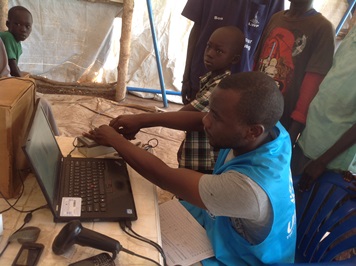Ugandan authorities struggle to cope with influx of S. Sudanese refugees
March 22, 2014 (KAMPALA) – Ugandan authorities say the country has witnessed a huge spike in the numbers of South Sudanese refugees crossing into Uganda via the Elegu border.

“We receive 500 of them daily [and] that seems to be very alarming compared to previous groups who have crossed in earlier December and January,” said Asiimwe.
He told Sudan Tribune that many refugees had told officials that they had walked hundreds of kilometres to reach Uganda.
According to statistics from Uganda’s three main resettlement camps of Kiryandongo, Rhino and Adjumani, about 70,000 refugees crossed into Uganda in the period from December to February.
Adjumani district is the closest camp to South Sudan, but lacks adequate land to cope with the influx of refugees.
Titus Jogo, another protection officer in the office of the prime minister, said plans are under ways to make Adjumani a transit point where transportation would be provided to truck new arrivals to other districts with more land space once they have been processed.
Jogo cited Kiryandongo or Arua in Imvepi, a former refugee resettlement area in the early 2000s which has the capacity to accomodate over 50,000 people, as possible relocation sites.
Following fierce fighting in Jonglei state, many South Sudanese fled to Nimule in Eastern Equatoria state, however, recent tensions between local residents and new arrivals from the Dinka tribe has forced thousands to cross into Uganda.
Ugandan officials say the sharp increases in refugees entering the country may be linked to the impending rainy season and insecurity fears given that the mobility of government troops will be limited during this period.
“They (refugees) also assume that [the] mobility of the government forces [to] deal with rebels attacks may be too difficult if the rains begin and they assume that the rebels may be now on the upper hand because the issue of rebels to hit and run,” said Jogo. “Now how does the government [plan to] diffuse those attacks with bad roads [and with] with rainy season. That [is] why many of them have decided to come in advance to Uganda,” he added.
The UN says almost one million people have been displaced since political tensions in the country erupted in violence in mid-December, including nearly 250,000 people who have fled to neighbouring countries.
(ST)
